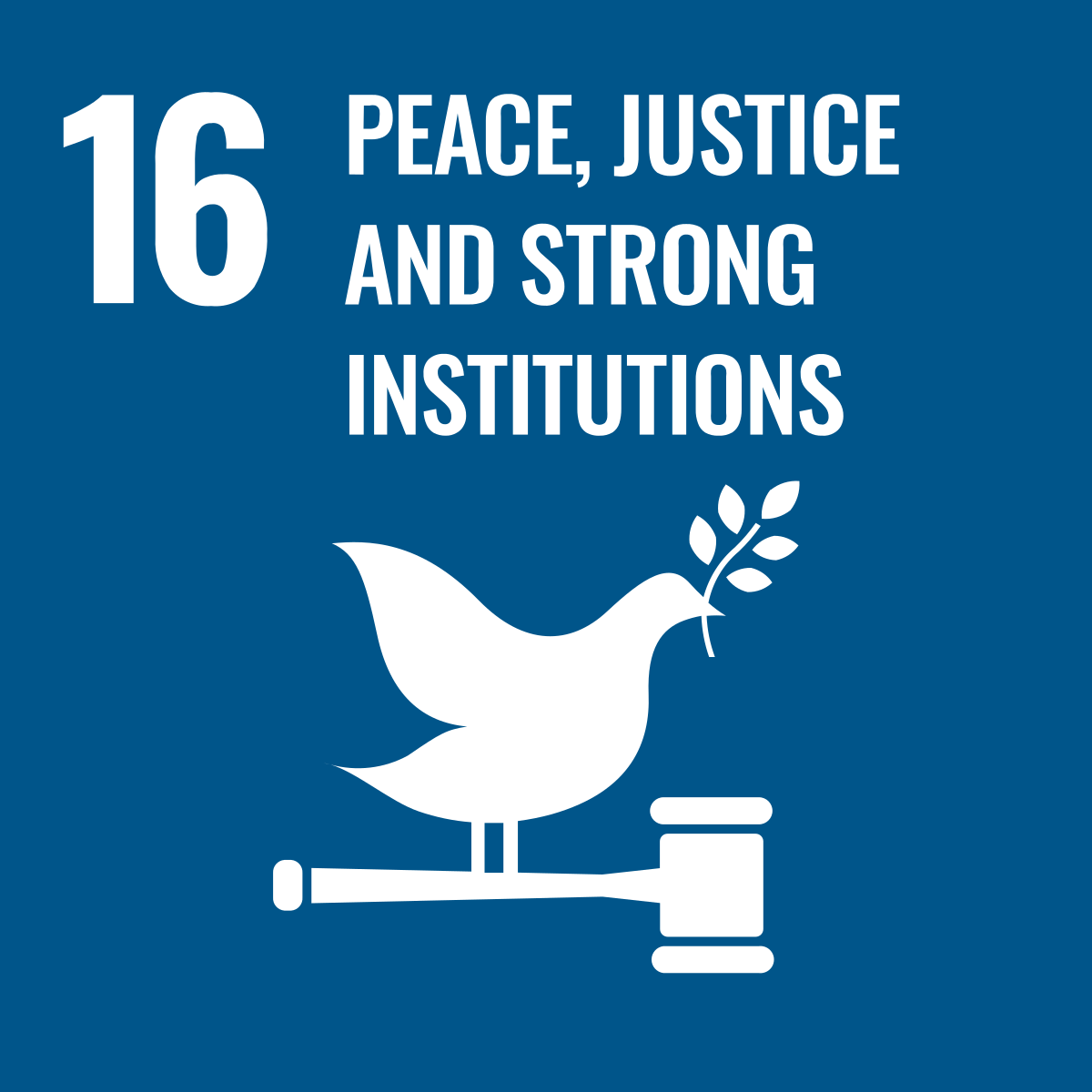PEACE,JUSTICE AND STRONG INSTITUTIION

The United Nations Sustainable Development Goals (SDGs) outline 17 areas of development that are critical to achieving a better world by 2030. One of these areas is Peace, Justice, and Strong Institutions. The SDG 16 aims to promote peaceful and inclusive societies for sustainable development, provide access to justice for all, and build effective, accountable, and inclusive institutions at all levels. This article explores the significance of peace, justice, and strong institutions, the challenges, and the role of individuals, organizations, and governments in achieving SDG 16.
Significance of Peace, Justice, and Strong Institutions
Peace, justice, and strong institutions are fundamental to achieving sustainable development. Peaceful societies promote economic growth, social cohesion, and stability. Justice ensures that everyone, regardless of their social status, race, or religion, has equal access to legal remedies, redress, and protection from violence and abuse. Strong institutions, on the other hand, provide a framework for good governance, accountability, and transparency, which are necessary for creating an enabling environment for economic growth and social development.
Inclusive institutions promote social equality and reduce the gap between the rich and the poor. A transparent and accountable government fosters trust between the people and the government, which is necessary for social cohesion and peace. A functioning legal system ensures that there is accountability for human rights abuses and promotes the rule of law, which is critical for a peaceful society.
Challenges
The road to achieving SDG 16 is riddled with challenges. One of the main challenges is the lack of political will to promote peace, justice, and strong institutions. In some countries, political leaders use their power to undermine the rule of law, suppress dissent, and violate human rights. Corruption is also a major challenge to achieving SDG 16. Corruption undermines the credibility of institutions, erodes public trust, and creates a culture of impunity that fosters injustice and inequality.
In some countries, weak institutions, lack of resources, and capacity constraints hinder the implementation of policies and strategies aimed at promoting peace, justice, and strong institutions. Conflicts, civil unrest, and violence also pose a significant challenge to achieving SDG 16. These challenges require a multi-faceted approach that involves individuals, organizations, and governments.
Role of Individuals
Individuals play a critical role in promoting peace, justice, and strong institutions. As citizens, individuals can exercise their right to vote, hold public officials accountable, and advocate for policies that promote peace, justice, and strong institutions. Individuals can also promote peace in their communities by engaging in dialogue, building trust, and supporting reconciliation efforts.
As consumers, individuals can demand ethical behavior from businesses, which can help reduce corruption and promote accountability. Individuals can also support organizations that promote peace, justice, and strong institutions by volunteering, donating, and participating in advocacy campaigns.
Role of Organizations-
Organizations play a vital role in promoting peace, justice, and strong institutions. Civil society organizations, including non-governmental organizations (NGOs), community-based organizations (CBOs), and faith-based organizations, can monitor and hold governments accountable for their actions. They can also advocate for policies that promote peace, justice, and strong institutions and provide support to victims of violence and abuse.
Private sector organizations can also play a significant role in promoting peace, justice, and strong institutions. They can adopt ethical business practices that promote transparency, accountability, and anti-corruption measures. They can also provide support to civil society organizations working towards promoting peace, justice, and strong institutions.
Role of Governments
Governments have a primary responsibility to promote peace, justice, and strong institutions. Governments can promote peace by investing in conflict prevention, mediation, and peacebuilding efforts. They can also strengthen the rule of law by ensuring that the legal system is fair,
effective, and accessible to all citizens. Governments can also promote transparency, accountability, and anti-corruption measures by implementing policies and laws that promote good governance.
In promoting justice, governments can ensure that all citizens have equal access to legal remedies and redress for human rights abuses. They can also promote social justice by investing in education, healthcare, and social welfare programs that reduce inequality and promote social cohesion.
To promote strong institutions, governments can invest in building the capacity of public institutions to deliver services to citizens effectively. They can also promote transparency and accountability by ensuring that public officials are accountable for their actions and that citizens have access to information about government activities.
Conclusion
The SDG 16 highlights the importance of promoting peace, justice, and strong institutions for sustainable development. Achieving this goal requires the collective efforts of individuals, organizations, and governments. By promoting peace, justice, and strong institutions, we can create a world that is free from violence, injustice, and inequality. We must work together to ensure that everyone, regardless of their social status, race, or religion, has equal access to legal remedies, redress, and protection from violence and abuse. Only then can we achieve a sustainable world where everyone can live in peace, justice, and dignity.

Peace, justice, and strong institutions are crucial for the development and progress of any society. India, as the world’s largest democracy and one of the fastest-growing economies, faces several challenges in ensuring peace, justice, and strong institutions for its citizens. This article examines the state of peace, justice, and strong institutions in India, the challenges faced, and the measures taken by the government to address these challenges.
Peace
India is a diverse country with many different cultures, languages, and religions. However, this diversity has also led to conflicts and tensions between various communities. One of the most significant challenges India faces is communal violence and religious extremism. Incidents of communal violence, such as the 2002 Gujarat riots, have claimed thousands of lives and caused extensive damage to property.
The Indian government has taken several measures to address communal violence and promote peace. One such measure is the enactment of the Communal Violence Bill, which aims to prevent and control communal violence by providing for speedy investigation and prosecution of offenders. The government has also established the Ministry of Minority Affairs to address the concerns of minority communities and promote their welfare.
Additionally, the government has initiated several peace-building efforts, such as the peace process in the northeast and Jammu and Kashmir. The government has engaged in dialogue with various groups to resolve long-standing issues and promote peace in these regions. These efforts have led to a reduction in violence and increased stability in the affected areas.
Justice
The Indian justice system faces several challenges, including a large backlog of cases, corruption, and inadequate infrastructure. The backlog of cases has resulted in long delays in the disposal of cases, leading to frustration among litigants and a loss of confidence in the justice system. Corruption is another significant challenge that undermines the credibility of the justice system and fosters impunity.
To address these challenges, the Indian government has initiated several reforms to improve the justice system’s efficiency and effectiveness. One such reform is the setting up of commercial courts and commercial divisions in high courts to handle commercial disputes expeditiously. The government has also initiated the National Judicial Data Grid, which provides real-time data on the status of cases in various courts, thereby promoting transparency and accountability.
The Indian government has also taken measures to address corruption in the justice system. The government has established anti-corruption bodies, such as the Central Vigilance Commission and the Central Bureau of Investigation, to investigate corruption cases. Additionally, the government has introduced the Right to Information Act, which empowers citizens to access information about government activities, including the justice system.
Strong Institutions
Strong institutions are crucial for promoting good governance, transparency, and accountability. The Indian government faces several challenges in this regard, including corruption, bureaucracy, and inadequate infrastructure. Corruption is a pervasive problem in India and undermines the credibility of public institutions. Bureaucracy and red tape are also significant challenges that hinder the efficient functioning of institutions.
To promote strong institutions, the Indian government has initiated several reforms. One such reform is the Digital India initiative, which aims to transform India into a digitally empowered society and economy. This initiative includes the creation of a digital infrastructure, including broadband connectivity, digital literacy, and e-governance services, to promote transparency and accountability in government.
The Indian government has also initiated several measures to address corruption and bureaucracy. The government has established anti-corruption bodies, such as the Central Vigilance Commission and the Central Bureau of Investigation, to investigate corruption cases. Additionally, the government has introduced several measures to simplify procedures and reduce bureaucracy, such as the introduction of the online Single Window System for Industrial Clearances.
Challenges
Despite the government’s efforts, India still faces several challenges in promoting peace, justice, and strong institutions. One of the most significant challenges is corruption. Corruption is pervasive in India and affects all aspects of society,from the government to the private sector. Corruption undermines the credibility of institutions and fosters impunity, hindering efforts to promote peace, justice, and strong institutions.
Another significant challenge is the inadequate infrastructure and resources. The justice system, for example, suffers from a lack of judges, courtrooms, and support staff, leading to long delays in the disposal of cases. Similarly, the police force suffers from a lack of training, equipment, and infrastructure, leading to inefficiencies in law enforcement.
The Indian government has also been criticized for its handling of human rights abuses, particularly against marginalized communities. The use of excessive force by security forces in conflict zones, such as Jammu and Kashmir and the northeast, has resulted in human rights violations and increased tensions.
Moreover, despite the government’s efforts to address communal violence, incidents of communal violence continue to occur, highlighting the need for sustained efforts to promote inter-community harmony and tolerance.
Conclusion
India faces several challenges in promoting peace, justice, and strong institutions. Corruption, inadequate infrastructure and resources, and human rights abuses are some of the significant challenges that the Indian government must address.
However, the government has taken several measures to promote peace, justice, and strong institutions, such as initiating peace-building efforts, improving the justice system’s efficiency and effectiveness, and promoting good governance and transparency.
To address the challenges faced, sustained efforts and a comprehensive approach are necessary. The government must continue to invest in building the capacity of public institutions, promoting transparency and accountability, and engaging in dialogue with all communities to promote peace and harmony. Additionally, civil society organizations and the media must play an active role in monitoring and holding the government accountable for its actions.
India has the potential to become a leader in promoting peace, justice, and strong institutions. However, achieving this goal requires the collective efforts of individuals, organizations, and the government. By working together, India can create a society that is free from violence, injustice, and inequality, and where everyone can live in peace, justice, and dignity.
CLICK HERE TO READ ANOTHER ARTICLE